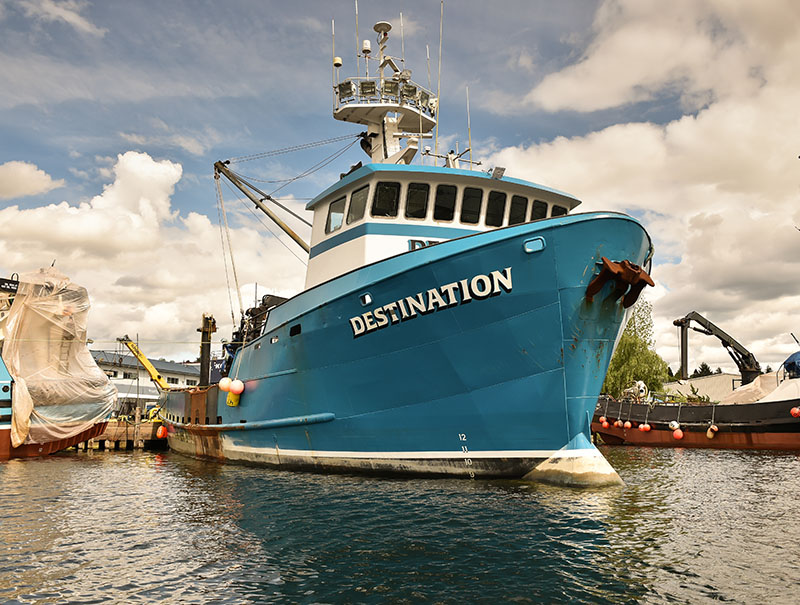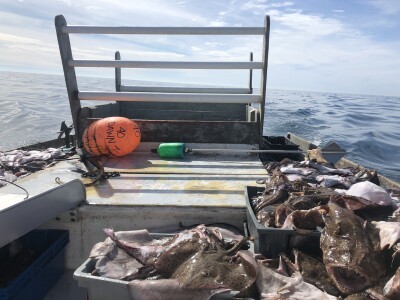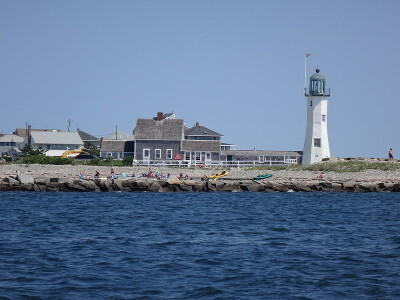The National Transportation Safety Board determined that heavy freezing spray conditions and poor stability to withstand icing were the probable causes of the capsizing and fatal sinking of the 98-foot crabber Destination in the Bering Sea in February 2017.
The Destination was traveling through frigid waters near St. George Island, Alaska, carrying 200 crab pots and preparing for opilio crab season when it capsized in minutes without sending a mayday call.
“Whatever happened happened very, very quickly,” said Spokesman Chris O’Neil, of the National Transportation Safety Board. “And there’s no one left to tell their story.”
According to the 24-page accident brief, the boat became weighed down with 203,650 to 339,416 pounds of ice on all exposed surfaces as gale force winds kicked up freezing ocean sprays.
To write the report, NTSB investigators reviewed the vessel’s mechanical history, pored over weather reports, and interviewed almost 50 people to piece together the probable cause of the accident.
The Coast Guard’s Marine Safety Center conducted a stability analysis of the
Destination using a computer-generated hull model from vessel plans dated November 16, 1992 (the plans for the lengthened vessel without a bulbous bow), taking into account the weight of crab pots, bait, the addition of the bulbous bow and estimated icing conditions.
"The MSC concluded that the vessel likely capsized in the large seas and winds as it came out of the lee of St. George Island due to prolonged icing conditions adding weight high on the vessel, leaving it with a lower freeboard and a decreased righting arm (lower stability)," reads the report.
The report detailed the experience of the crew. The captain, Jeff Hathaway, had managed the Destination for 23 years and was described by vessel owner David Wilson as very capable and knowledgeable.
"The crew referred to him as 'dad,' and other captains called him their 'go-to guy,'" according to the report.
All six crew members had experience fishing in the Bering Sea and serving on the Destination. The engineer had worked 21 years onboard, and the years of service for the four deckhands ranged from 3 to 22 years.
According to the owner, the captain would “hold up for weather” in the past but could not remember if any of those delays was initiated by a concern for freezing spray. In describing the captain’s experience with avoiding ice buildup, a former crew member said that during the many times the Destination encountered icing from freezing spray the instructions from the captain to him included “going out and beating ice… [to] stay on top of it so that it doesn’t get out of hand.”
Investigators believe fatigue played a role in the decision to continue in the freezing conditions. In the month leading up to the accident, the boat was cod fishing for a total of 27 days.
In one of the text messages retrieved “by investigators, a crew member wrote his father on January 23, ‘Oh my god, I haven’t slept in days.’”
A former crew member told investigators that the crew cycled through the stack 1.5 times a day setting and hauling 300 pots, with 4- or 6-hour rotations to sleep.
Investigators also considered that pressure, both self-imposed and from the commercial fishing industry, that the captain and crew might have faced. Former crew members speculated during testimony that "the captain may have chosen to fish for cod longer than usual primarily as an economic incentive: to establish a ‘catch history’ that would increase the vessel’s future share allocated to them, should cod become a fishery regulated by a quota system similar to opilio crab, and extend the season to maximize the crew’s earnings."
The captain would've been racing against the clock to make the final cod delivery of the season at the Trident Seafoods facility at Sand Point before it closed, while also thinking about changing gear and not losing any time crabbing.
Hathaway and crew members Kai Hamik, Darrik Seibold, Larry O’Grady, Raymond Vincler and Charles G. Jones were lost with the boat. The loss of the Destination marks the fleet’s deadliest accident since 2005.
The accident report from the National Transportation Safety Board is available in full online.







